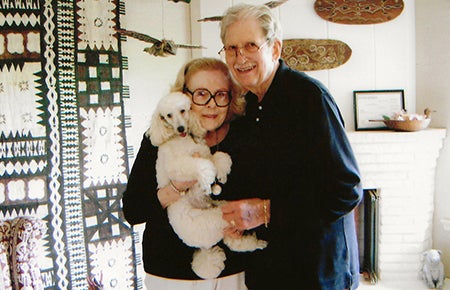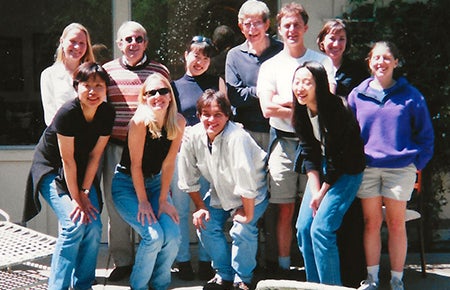
In Memoriam: Maurice ‘Don’ Van Arsdol Jr.
Professor Emeritus of Sociology Maurice “Don” Van Arsdol Jr. built relationships around the world. He planted seeds of thought in many minds and nurtured a new generation of researchers and professors.
Even when he retired, he didn’t really. He continued to study border security and immigration issues and rising sea levels as an adjunct professor at the Middlebury Institute of International Studies in Monterey, Calif.
His wife, Marian, whom he first met at an elementary orchestra in the Seattle area when she was 11 and he was 12 — and again later when they were students at the University of Washington — may well have summed up Van Arsdol’s nurturing nature and unshakeable dedication: “He would start working in the garden at sundown, even after a full day’s work.”
The couple was married for 68 years. They always celebrated two anniversaries — the day that they met and their wedding.
Born an only child to Maurice Sr. and Madge Belts Van Arsdol on May 4, 1928, Don Van Arsdol grew quite a garden of friends, students and researchers over the course of his life, until he passed away on Sept. 19 at 90 years old.

Marian and Maurice Van Arsdol with their beloved poodle.
Global networking
For 38 years at USC Dornsife, Van Arsdol mentored students and faculty in demography and population studies before becoming an emeritus. Even after he and his wife moved to Carmel, Calif., he continued to conduct research.
“He was wonderfully supportive of junior faculty,” recalls Judith Treas, former professor of sociology and chair of the Department of Sociology at USC Dornsife. She is now at the University of California, Irvine.
Having worked with Van Arsdol for 15 years, Treas says that Van Arsdol had, through charm and commitment, built an extensive network of researchers and associates in organizations and governments around the world.
Some of the training programs, Treas says, were planned on short notice. “We suddenly found that our very small master’s program had added 20 Indonesians, some of whom had very limited English, and I found myself with a much larger research design class,” Treas says. “With the support of the United Nations, we provided training to the students to return and pursue jobs in critical areas like public health.”
“Don was an extraordinary educator, winning core grants from the Hewlett and Bixby Foundations, the United Nations, and the NIH (National Institutes of Health) to fund and train dozens of graduate students from all over the world in a joint population and sociology Ph.D. program,” Timothy Biblarz, associate professor of sociology and gender studies and chair of the Department of Sociology at USC Dornsife, wrote in an announcement of Van Arsdol’s passing. “During this period, we enjoyed graduate students from Zaire, Botswana, Kenya, Malawi, Nepal, Indonesia, the Philippines, India, China, Japan, Bahrain and many other countries.”
Research with anticipation
Van Arsdol’s work delved into some of the world’s most pressing issues — for instance, urban growth matters such as the social impact of Los Angeles International Airport’s expansion and the flow of immigrants across borders in the United States and, separately, in China, where he also studied family planning issues.
His interests were broad. Phyllis Grifman, associate director of Sea Grant at USC Dornsife, says Van Arsdol also was a “prescient researcher” on sea-level rise.
“His work anticipated the social vulnerabilities that would be faced in Ventura County and other parts of California due to the potential flooding that would accrue to schools, hospitals and other societal serving institutions on the low-lying Oxnard plain,” Grifman says.
Van Arsdol authored more than 75 papers since his research career began in 1952 at the University of Washington.
A warm welcome
Van Arsdol not only recruited students in Asian and African nations for USC’s sociology graduate studies, but, friends and colleagues say, he and his wife often welcomed those students into their home in the Pacific Palisades, particularly for holiday parties. His wife recalls that one Thanksgiving, 27 students attended, and they recited prayers in four different languages before diving into a feast with two large turkeys.

Don Van Arsdol, center rear, with students at his home.
Whenever necessary, Van Arsdol did everything he could to ensure the students’ immediate families could stay with them while they completed their studies.
“He and Marian really provided them with a kind of support system,” says Ed Ransford, professor of sociology at USC Dornsife.
Amentha Dymally, now a USC Dornsife Development Officer, was Van Arsdol’s longtime assistant. She says Van Arsdol saw her potential when she came to work for him, despite her youth.
“Because I was so young, he saw that I would be the type of person that he could easily run over,” she said. “So, he strongly suggested that I go to an assertiveness class. I was able to work with him for 12-plus years because of that class.”
A mentor’s mentor
Friends note that Van Arsdol, perhaps because of his upbringing or his stint as a first lieutenant in the U.S. Army, was a gentleman, kind and witty. He was the reason that Angela Constable, now a professor at California Lutheran University, decided to focus on population studies when she began to attend USC for graduate school back in 1991.
“I worked with him on several of the National Oceanic and Atmospheric Administration projects under his tutelage, and we became friends — very dear friends,” says Constable, who became so close to Van Arsdol and his wife over the years that they were with her when her own husband passed away.
“Don saw the bigger picture in almost everything,” says Constable. “I would have these arguments with him on the phone about something, and then my husband would say, ‘Don’t argue with Don.’” Van Arsdol usually gave sound advice.
Van Arsdol was always a mentor, long after his students had become professors or demographers.
“Some of the exchange students whom he mentored have some really well-placed positions,” says Constable. “I hope that my students remember me in as kind words as his students remember him.”